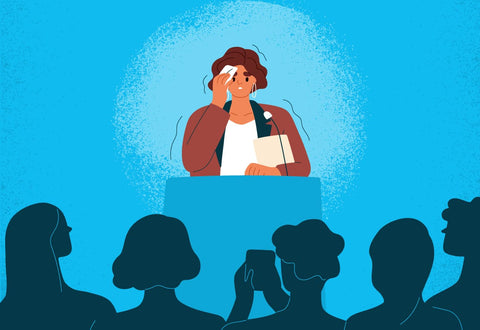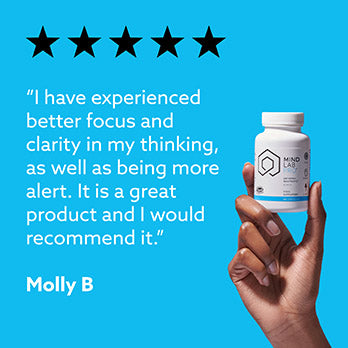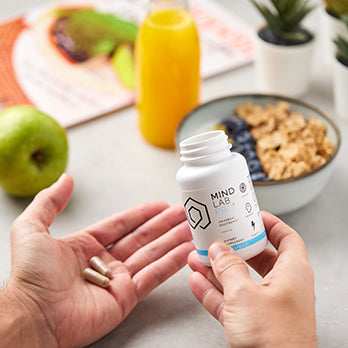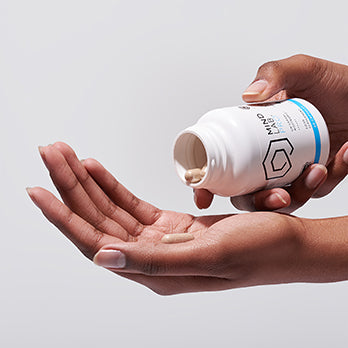Have you experienced the nerve-wracking grip of performance anxiety? If so, you already know how this issue can limit your life enjoyment. But you may not know that there are natural supplements for anxiety -- including brain supplements called nootropics for anxiety -- that may help.
In this article, we'll begin by exploring the concept of performance anxiety. We'll then delve into nootropics, taking a closer look at specific natural compounds that have shown potential in clinical studies to help with performance-related challenges like stress, anxiety and brain fog.
Lastly, we'll wrap up by showcasing a selection of supplements available in today's market that feature the most effective nootropics for managing performance anxiety. Our picks can be combined too, to create an advanced stack for performance anxiety relief.
Ready to step into the spotlight with confidence? Let's get started!
Note: Severe anxiety requires more than a supplement. When it comes to a treating anxiety disorders, consulting with a doctor is critically important. In these cases, prescription medications may be offered, including beta blockers. This article discusses natural dietary supplements, only.
Quick Summary: Top Products for Performance Anxiety
Top Nootropic Supplement: Mind Lab Pro®
Mind Lab Pro® (MLP®, the Universal Nootropic) is an ultramodern brain supplement that supplies 11 natural nootropics, including several of our top choices for helping with mood and apprehension.
MLP® is a whole-brain booster designed to be a "Universal Nootropic."
In theory, MLP optimizes the entire brain so it can flex to deliver whatever cognitive support you need, right when you need it. Imagine how useful that might be in the context of performance anxiety.
In terms of general mental performance support, MLP is suggested to help with:
- Memory, learning, quick recall
- Concentration, attention & focus
- Motivation, bright mood, clarity
- Mental energy (no caffeine though)
- Relaxation and stress resistance
Overall, Mind Lab Pro is made to help your brain do everything better. Whether you are working, studying for an exam, competing at sports, socializing, and yes, doing presentations and performances as well. It is most versatile and effective supplement you can take for all types of anxiety.
Get the Best Deal on MLP® Now
Bonus picks: More supplements for performing under pressure
- Performance Lab® Mind: Top pick for professional and work-related apprehension due to its benefits for stress, multitasking and mental burnout.
- Performance Lab® Prebiotic: Optimizes the gut microbiome (probiotic colony) which in turn regulates brain chemicals that are involved in mood and relaxation
- Performance Lab® Omega-3: Important for overall brain health, the Omega-3 fatty acids have also been shown to influence aspects of mood related to anxiety
- Performance Lab® Sleep: Poor sleep can create tension that further worsens sleep. It's a vicious cycle, but this advanced sleep formula with melatonin from tart cherry can help.
We go into more detail on each of these nootropic supplements further down the page.
How Performance Anxiety Feels
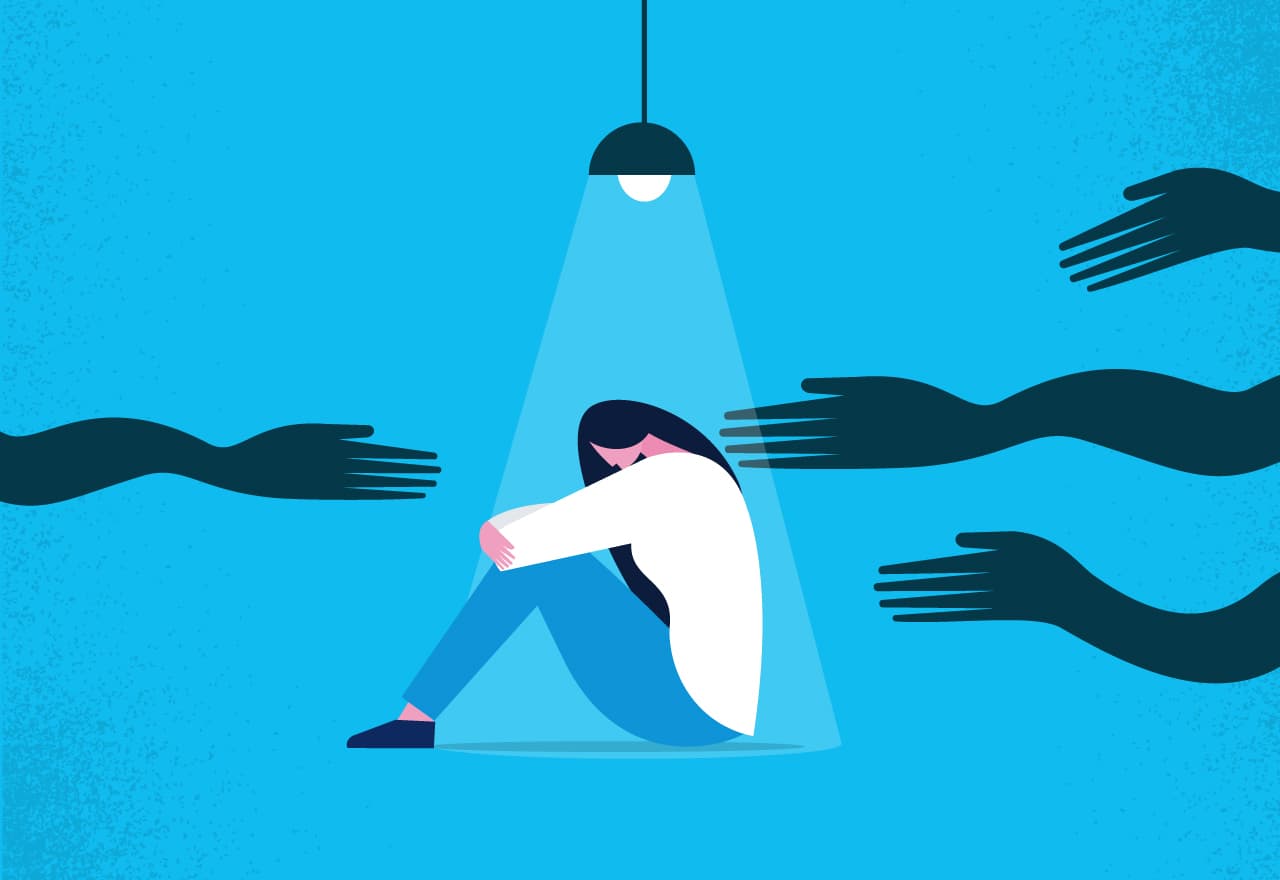
It seems like a perfectly rational sort of fear.
You're about to take an important test - like your SAT or GRE.
You've been invited to a party full of people you don't know.
You're trying to figure out what the heck you're going to say before your turn at the poetry slam.
In these cases, anyone would naturally feel a little nervous.
Being spotlighted can be stressful, and during stress your brain's "fight-or-flight" mechanism kicks in, making stage fright symptoms similar to those that occur when you're actually in danger.
Physical symptoms of performance anxiety may include:(1)
- Dry mouth
- Sweating
- Cold hands
- Trembling
- Blood pressure spikes
- Nausea
- Racing pulse
- Shallow breathing
- Vision changes
People whose careers put them at the center of attention often experience performance anxiety. Even though we can't see it, some of the most successful athletes, actors, musicians, and public speakers get super nervous before a big performance.
But for people who just can't seem to get it under control, performance anxiety can seem like an insurmountable hurdle that makes us miss out on activities we enjoy and even affect our careers.
Different Performance Anxiety Scenarios
According to the CDC, nearly 1 in 5 adults in the USA has some type of mental health concern.(2) Anxiety disorders are particularly widespread, ranging from generalized anxiety disorder to social anxiety disorder and everything in between.
Entertainment and the Arts: Almost every entertainer has experienced stage fright at some time. Violin maestro Itzhak Perlman advises performers to understand how your nerves affect you before a performance so you can make adjustments during practice sessions rather than on stage.
Public Speaking: Fear of being criticized by others accompanied by physical and emotional sensations can seriously interfere with the ability to successfully deliver a speech or presentation.(3) Nootropics for performance anxiety may promote relaxation and verbal cognition; helpful for public speaking.
Competitive Sports: Athletes deal with unique mental and physical demands. Physiological symptoms of athletic performance anxiety may include headaches, muscle tension, gastrointestinal issues, elevated heart rate and difficulty breathing.
In the Bedroom: Sexual performance anxiety is a common intimacy issue. Male sexual performance problems are talked about more often, but performance anxiety can curb female arousal, too.
At Work: Workplace performance anxiety affects people in all types of professions. The symptoms can be the same as other performance anxiety symptoms, but the triggers can vary from using the company toilet to giving a presentation in the boardroom.
Academic Anxiety: Anxiety is a common problem on college campuses. Some studies show that 80% of college students say stress interferes with their academic progress.(4) Excess anxiety interferes with concentration and memory, which are critical for academic success.(5)
How Supplements May Help You Perform While Anxious
So, what roles do anxiety supplements, including nootropics, play? What other mental health benefits might they offer? Some potential beneficial bioactivities from these dietary supplements include:
- Neurotransmitter effects: Supplements regulate brain chemicals, including those that control feelings of anxiety and relaxation.
- Anti-stress effects: Some supplements for public speaking anxiety and other jitters work by improving your ability to manage stress, especially in the context of performance.
- Brain wave support: L-Theanine is a dietary supplement shown to modulate brain waves, helping the brain to reach a relaxed-but-alert state that is ideal for presentations.
- General mood support: Anxiety and stress can wreak havoc on mood. Supplements can help maintain a positive mood, which can go a long way to reduce anxiety symptoms.
Next, let's explore some of the ingredients found in supplements for anxiety that deliver some of these benefits and may help you to perform better.
The Best Nootropic Ingredients
Many nootropic compounds found in brain supplements play a role in regulating mood.
Little research has been done on natural products for performance anxiety, specifically.
However, researchers have investigated numerous nootropics for their potential to help with general anxiety, stress, relaxation responses, mood balance, brain health and more.
As we cite research in the following list, consider how these nootropics' benefits may indirectly help with the symptoms of performance anxiety.
L-Theanine

L-theanine is a natural amino acid found in tea leaves with potential usefulness in managing performance anxiety. It popularly used to promote relaxation and reduce stress without causing drowsiness.
When taken as a supplement, L-theanine before presentation can help alleviate symptoms of stress and anxiety, such as nervousness, racing thoughts, and jitters.
L-theanine also fosters a calm and focused state of mind, making it particularly beneficial for individuals facing situations that require enhanced cognitive performance and clear thinking, such as exams or artistic performances. L-theanine public speaking benefits are also noted by some users.
L-theanine's non-sedating nature sets it apart from doctor-prescribed medications to treat anxiety. This positions L-Theanine as an attractive option for those seeking a natural and side-effect-free approach with supplements for racing thoughts and managing performance-related stress.
Did you know? L-Theanine is believed to support relaxation because it promotes calming neurotransmitters dopamine and serotonin. It also enhanced brain waves in the Alpha (8-14 Hz) frequency. Alpha brain waves are associated with calming, relaxing and tranquil feelings. Research suggests it may reduce heart rate, lower stress hormone levels and improve concentration, alertness, and mood; it also is suggested to have neuroprotective effects.(6)
Bacopa Monnieri

Bacopa monnieri, a nootropic herb known as Brahmi, has shown promise in its potential usefulness for performance anxiety. This adaptogenic herb has been traditionally used in Ayurvedic medicine to enhance cognitive function and reduce acute stress, benefits that can be helpful for performing while anxious.
Bacopa monnieri supplies a complex of active bacosides and antioxidants. It is believed to work by modulating the release of stress hormones, thereby promoting a calmer mental state and reducing anxiety. It is thought to improve cognitive performance and memory, which can be particularly beneficial for individuals dealing with performance anxiety in academic, professional, or social settings.
Researchers have noted Bacopa appears to be linked to reduced stress, with studies suggesting it may support healthy mood, sharpen cognitive performance, reduce mild anxiety and regulate the stress hormone cortisol.(7)
While research on Bacopa monnieri's effects on anxiety is still evolving, early studies and anecdotal evidence suggest that it may offer a natural and holistic approach to managing performance-related stress.
Did you know? Bacopa's biggest claim to fame is that it is believed to help with many aspects of memory, including those strongly associated with learning and new knowledge retention. For these reasons, Bacopa may be an ideal nootropic supplement for students whose symptoms may manifest during exams.
Learn more about Bacopa Monnieri
Rhodiola Rosea

Rhodiola is a root that may help strengthen mind-body resistance to stress because it's an adaptogen, a family of herbs known for decreasing cellular sensitivity to stress and balancing mood.
Rhodiola works via a complex interplay of neurotransmitters (stimulates dopamine, serotonin, norepinephrine), energy metabolism effects, and also blunts the production of stress hormones like cortisol.
While it has not been studied for performance nerves, specifically, Rhodiola has shown some potential for helping with anxiety and mood in clinical studies. Researchers have suggested Rhodiola might:
- Support a healthy and positive mood in those struggling with mild-to-moderate mood concerns.(8)
- Help subjects with General Anxiety Disorder (GAD) to ease their anxiety symptoms.(9)(keep in mind that this is an early pilot study, only)
Rhodiola rosea's stress-fighting effects have long been prized by athletes. It seems to be a good choice for managing apprehension while excelling at performance and may be one of the leading supplements for public speaking anxiety.
Learn more about Rhodiola Rosea
Phosphatidylserine (PS)

Phosphatidylserine is a brain-healthy compound known as a phospholipid. Evidence shows that phospholipids are crucial for brain cell membrane health and regeneration.
As a phospholipid, Phosphatidylserine (PS) may improve brain function and cell-to-cell signalling called neurotransmission.(10)
Healthy brain cells help maintain clarity, balance mood, and improve concentration and focus. By helping to promote healthy brain cell function, PS supports communication within the brain and may help improve cognitive function under stress.
At least one study linked PS to a reduction in perceived stress levels and significant improvement in the number of good ball flights during tee-off among a group of young golfers, possibly leading to better golf scores. This research could indicate that PS may help prevent athletes to stay calm, cool and collected while pursuing peak performance.(11)
PS has also been suggested to help reduce symptoms of stress, potentially by regulating the stress hormone cortisol. One clinical trial found that subjects taking PS for 30 days appeared to alleviate stress symptoms and improve general mood.(12)
Learn more about Phosphatidylserine (PS)
Lion's Mane Mushroom

Lion's Mane Mushroom, also known as yamabushitake, is a brain-boosting nootropic that supplies active compounds called hericenones and erinacines. It has gained significant recognition as a valuable brain supplement, particularly in the context of mood.
Recent research suggests that Lion's Mane Mushroom's support of NGF (Nerve Growth Factor) may offer a range of cognitive benefits, potentially including relief from anxiety-related concerns.
In a study, subjects were randomly assigned to either receive a placebo or a cookie infused with Lion's Mane Mushroom extract for a four-week period.
Following this intervention, researchers conducted mental performance testing on participants and revealed that Lion's Mane Mushroom may have the potential to mitigate symptoms of depression and anxiety. These results could represent a potential avenue for managing performance-related stress and anxiety.(13)
Learn more about Lion's Mane MushroomCholine (as Citicoline)

Choline is a brain-healthy nutrient found in many of today's top brain supplements and nootropic stacks.
In the context of performance, choline serves as a precursor to acetylcholine, a neurotransmitter that regulates anxiety and is crucial for memory, learning, and muscle control. Getting enough choline provides a stable foundation for cognitive function, potentially reducing nervousness, cognitive fog, and other challenges associated with performance anxiety.
Choline may also support overall brain health because it energizes brain cells and aids in the formation and maintenance of healthy cell membranes. The recommended form to look for is citicoline, which efficiently synthesizes phosphatidylcholine that promotes brain cell regeneration and brain cell repair.
There is some evidence backing the use of citicoline and choline supplements to help with feelings of apprehension. In one study, researchers concluded that study subjects who had higher levels of circulating choline appeared to experience less anxiety.(14)
Prebiotic Fiber

Have you ever noticed you can feel performance-related nerves in your gut? The gut is so intertwined with mental health that it has been called the "second brain" by some scientists.
The gut's connection to the brain is explained by the microbiome: A colony of beneficial bacteria (probiotics) that inhabits the digestive tract.
Intriguingly, the microbiome is responsible for producing approximately 95% of the body's serotonin, a brain chemical associated with feelings of happiness and satisfaction.(15)
A research review also reported that probiotics may help with mood issues in those with anxiety.(16) Ultimately, boosting the microbiome may have a profound impact on overall health, including mental and emotional well-being.
While probiotics from fermented foods and supplements are known to support the microbiome, prebiotics may offer even more significant benefits. Prebiotic fiber feeds your microbiome, fostering the growth and flourishing of probiotics within your gut in a more reliable way.
Omega-3 Fatty Acids (DHA & EPA)

Omega-3 fatty acids are known for numerous health benefits. They help cardiovascular wellness, central nervous system function, immune performance and far more -- including mood and mental health.
In one review that analyzed multiple human clinical trials, researchers discovered a trend: The Omega-3 fatty acids (EPA and DHA, specifically) appeared to help manage anxiety symptoms, with greater anxiety reducing benefits recorded in those who seemed to be struggling more.(17)
Tip: If you thought fish oil was the only supplement to supply Omega-3s, we've got good news. Today's most cutting-edge Omega-3 supplements are now sourced from plant origins. Algae is a particularly clean, efficient and eco-friendly source of EPA and DHA.
Magnesium
Essential mineral magnesium is a key player in overall health, facilitating over 300 different biological activities in the human body. Among those many roles, magnesium regulates brain chemicals and relaxation responses that may help people who strive for reduced anxiety.
When it comes to brain chemicals, magnesium is sometimes used in GABA supplements. Also called gamma aminobutyric acid, GABA helps to regulate some aspects of relaxation, stress resistance and anxiety relief.
Magnesium has also been linked to the feel-good chemical serotonin, which may help you to better navigate stressful situations.
What does it all mean for feelings of apprehension? Some researchers have noted magnesium supplements appear to be helpful for boosting mindset (in people who are down in the dumps) (18); while other researchers have reported that in early studies, magnesium has shown potential to help stress related symptoms like apprehension.(19)
L-Tryptophan
L-Tryptophan, classified as an essential amino acid, holds a key role in the synthesis of serotonin. When the body is low on L-Tryptophan, it can lead to low serotonin production, potentially rendering individuals more vulnerable to anxiety and mood concerns.
Some researchers have suggested that there may be a connection between sufficient L-Tryptophan intake and the reduction of depressive and anxious mood states.(20)
This research seems to indicate that L-Tryptophan may regulate brain chemicals in a way that helps to relieve stress and anxiety-related symptoms -- including restlessness, tension, and excessive worry.
L-Tryptophan is also associated with healthy sleep, which may help with sleep quality and daytime performance problems that are induced by feelings of fear and apprehension.
The Best Supplement for Performance Anxiety: Mind Lab Pro®
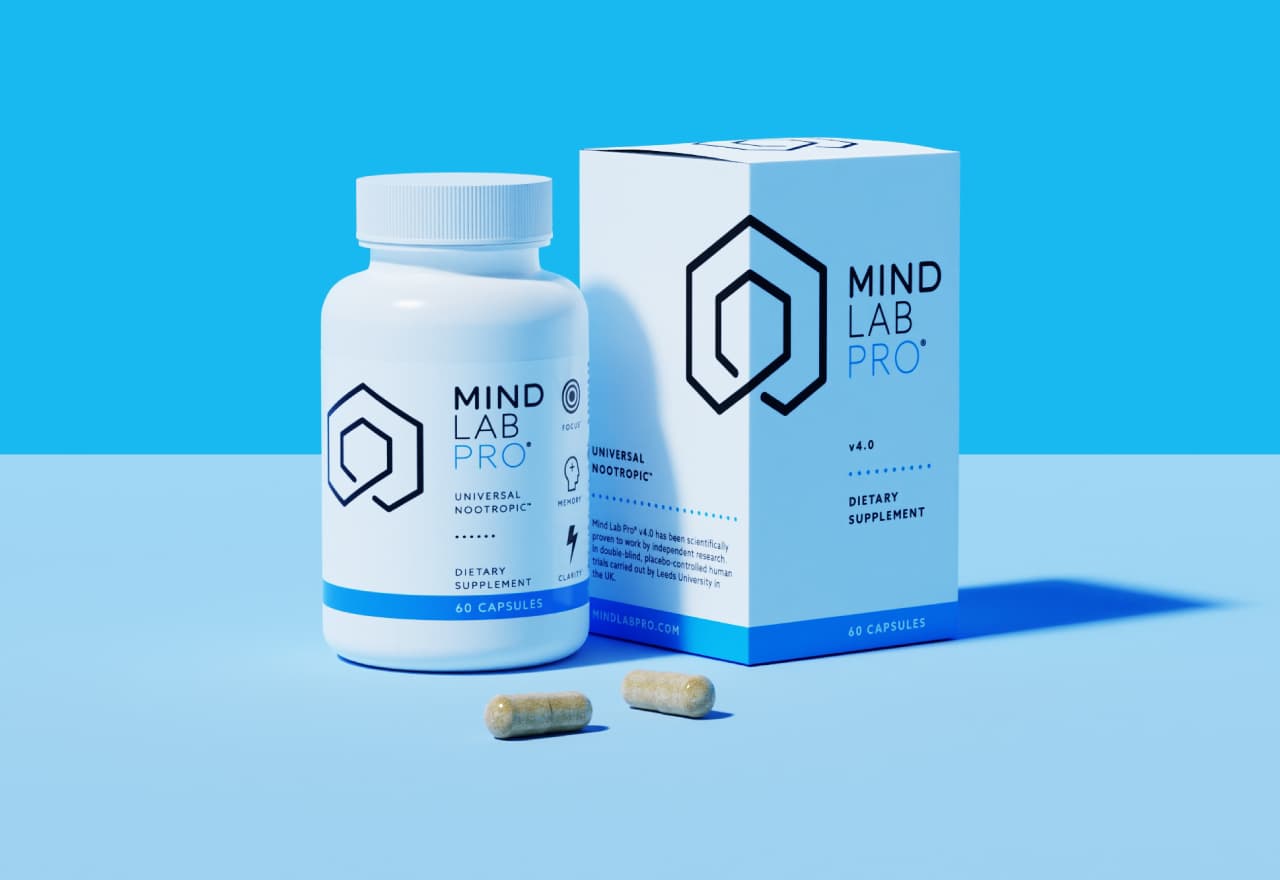
If you are looking for a single product that supplies many of the top nutrients for performance discussed in this article, Mind Lab Pro (MLP) is it. This formula supplies:
- Citicoline, 250 mg
- Phosphatidylserine (PS), 100 mg
- Bacopa monnieri, 150 mg (full-spectrum extract, 24% bacosides with 9 bioactives)
- Organic Lion's Mane Mushroom, 500 mg (fruit and mycelium)
- Maritime Pine Bark Extract, 75 mg: (Standardized to 95% proanthocyanidins)
- N-Acetyl L-Tyrosine, 175 mg
- L-Theanine, 100 mg
- Rhodiola rosea, 50 mg (Standardized to 3% rosavins and 1% salidrosides)
- NutriGenesis® B-Vitamins: Vitamin B6 (2.5 mg), Vitamin B9 (100 mcg), Vitamin B12 (7.5 mcg)
As a result of its far-reaching design, MLP functions as a whole-brain optimizer, capable of boosting any aspect of cognition, mental wellness, and overall brain health as needed. With this one stack, you can support:
- Memory of all types; learning, recall, etc.
- Quick mental processing
- Focus, concentration and attention
- Overall brain health and brain anti-aging
- Mood balance, motivation, drive
- Stress resistance in times of anxiety
- Creativity and abstract problem solving
Notably, MLP is a "Universal Nootropic." It is formulated to rise to whatever occasion you may need. So when you require mental sharpness, you get it. If you're feeling stressed, MLP helps calm you down. And when the time comes to perform, you know you can be ready.
With 11 nootropics in one formula, Mind Lab Pro may promote relaxation, calmness, and stress resistance better than any other supplement on the market -- making it an ideal choice for all types of performance, especially if you're feeling anxious.
Mind Lab Pro® - Stimulant-Free for Many Reasons
Mind Lab Pro® is formulated to be completely free of caffeine and other stimulants.
There are many reasons why Mind Lab Pro® is stim-free, one of which is that nootropics with caffeine can actually intensify performance anxiety -- a counterproductive effect for those who are taking nootropics for performance anxiety support.
With Mind Lab Pro®'s all natural formula, you won't have to worry about the negative anxiety-exacerbating side effects often associated with stimulants.
Beyond helping to reduce anxiety and offering stress relief, MLP® helps with focus, attention, concentration, memory, mental clarity and pretty much any other aspect of cognition you can think of.
MLP® is also backed by human research.
- Study 1: Subjects taking MLP showed significant improvements (compared to placebo) in information processing tasks.(16)
- Study 2: Subjects taking MLP had significant improvements across multiple memory functions, including auditory, visual, visual working, immediate and delayed recall memory.(17)
Pricing & Shipping
- 1 Bottle (one month supply): $69 ($2.30/serving)
- 2 bottles (two month supply): $138 ($2.30/serving)
- Best deal: 3 bottles + 1 free, with free shipping: $207 ($1.73/serving)
- All covered by 30-day money back guarantee
Buy MLP® Now
Additional Supplements for Performing while Anxious
Mind Lab Pro® is the top supplement overall for managing apprehension and promoting a healthy mood. But there are additional supplements that can help, too. Some of the best are:
- Performance Lab® Mind: If work is creating a lot of apprehension in your life, then this could be the supplement for you. Mind uniquely optimizes the brain for both intense cognition and healthy recovery, helping to support a balanced mind-set that's ready to perform with confidence.
- Performance Lab® Omega-3: Omega-3s should be in every supplement regimen. This formula presents the cleanest, most eco-friendly Omega-3s available, sourced from marine algae. It's a great way to help promote overall brain health and healthy mood balance.
- Performance Lab® Prebiotic: This clean fiber supplement feeds the microbiome for enhanced production of calming neurotransmitters like dopamine and serotonin. It's also a great all-round supplement for digestive health, cardiovascular wellness and more.
- Performance Lab® Sleep: Can you imagine a supplement that helps you out when anxiety is interfering with your sleep? Performance Lab® Sleep is it. It supplies magnesium, tart cherry, L-tryptophan and sea buckthorn to help induce sleep and relaxation at the same time.
Conclusion
Performance anxiety is a mind state that's often caused by fear of failure and negative self-talk. Confronting your fears and vulnerabilities, accepting yourself for who you are, embracing your strengths and weaknesses, and just putting yourself out there over and over can help you overcome performance anxiety in the long run.
Some supplements may help mediate some of the symptoms of apprehension and help your brain work better under pressure.
But remember there's no replacement for good self-care, including proper nutrition, an active lifestyle, and getting enough sleep.
Equally critical: While supplements may help in the context of complementary and integrative health, only a doctor can help you with treating anxiety symptoms.
Always take supplements under the direction of your doctor. If your symptoms are severe, your doctor may prescribe anxiety medications (such as beta adrenergic blocking agents) or modalities like cognitive behavioral therapy (CBT) to further help you on your road to recovery.
References
- https://mag.uchicago.edu/science-medicine/performance-anxiety
- Mental Health in the Workplace (cdc.gov)
- The Board of Regents. Public Speaking Anxiety. University of Wisconsin. 2018.
- Office of Student Success. Overcoming Academic Anxiety. Louisiana State University Shreveport. 2017.
- Learning Strategies Center. Understanding Academic Anxiety. Cornell University. 2018.
- Kimura K, Ozeki M, Juneja LR, Ohira H. L-Theanine reduces psychological and physiological stress responses. Biol Psychol. 2007 Jan;74(1):39-45. Epub 2006 Aug 22.
- Benson S, et al. An acute, double-blind, placebo-controlled cross-over study of 320 mg and 640 mg doses of Bacopa monnieri (CDRI 08) on multitasking stress reactivity and mood. Phytother Res. 2014 Apr;28(4):551-9. [PubMed]
- Darbinyan V, Kteyan A, Panossian A, et al. Rhodiola rosea in stress induced fatigue - a double blind cross-over study of a standardized extract SHR-5 with a repeated low-dose regimen on the mental performance of healthy physicians during night duty. Phytomedicine 2000;7:365-371.
- Bystritsky A, Kerwin L, Feusner JD. A pilot study of Rhodiola rosea (Rhodax) for generalized anxiety disorder (GAD). J Altern Complement Med. 2008 Mar;14(2):175-80. doi: 10.1089/acm.2007.7117. PMID: 18307390.
- Hanahan DJ, Nelson DR. Phospholipids as dynamic participants in biological processes. The Journal of Lipid Research, 25, 1528-1535. 1984 Dec.
- Jager R, et al. The effect of phosphatidylserine on golf performance. J Int Soc Sports Nutr. 2007; 4: 23. doi:10.1186/1550-2783-4-23.
- Benton D1, Donohoe RT, Sillance B, Nabb S. The influence of phosphatidylserine supplementation on mood and heart rate when faced with an acute stressor. Nutr Neurosci. 2001;4(3):169-78.
- Mayumi N, Shimizu K, Kondo R, Hayashi C, Sato D, Kitagawa K, & Ohnuki K 2010, Reduction of depression and anxiety by 4 weeks Hericium erinaceus intake. Biomedical Research. 31(4): 231-237.
- Bjelland I, Tell GS, Vollset SE, Konstantinova S, Ueland PM. Choline in anxiety and depression: the Hordaland Health Study. Am J Clin Nutr. 2009 Oct;90(4):1056-60. doi: 10.3945/ajcn.2009.27493. Epub 2009 Aug 5. PMID: 19656836.
- Appleton J. The Gut-Brain Axis: Influence of Microbiota on Mood and Mental Health. Integr Med (Encinitas). 2018 Aug;17(4):28-32. PMID: 31043907; PMCID: PMC6469458.
- Chao L, et al. Effects of Probiotics on Depressive or Anxiety Variables in Healthy Participants Under Stress Conditions or With a Depressive or Anxiety Diagnosis: A Meta-Analysis of Randomized Controlled Trials. Front Neurol. 2020 May 22;11:421. doi: 10.3389/fneur.2020.00421. PMID: 32528399; PMCID: PMC7257376.
- Su KP, et al. Association of Use of Omega-3 Polyunsaturated Fatty Acids With Changes in Severity of Anxiety Symptoms: A Systematic Review and Meta-analysis. JAMA Netw Open. 2018 Sep 7;1(5):e182327.
- Tarleton EK, Littenberg B, MacLean CD, Kennedy AG, Daley C. Role of magnesium supplementation in the treatment of depression: A randomized clinical trial. PLoS One. 2017 Jun 27;12(6):e0180067. doi: 10.1371/journal.pone.0180067. PMID: 28654669; PMCID: PMC5487054.
- Boyle NB, Lawton C, Dye L. The Effects of Magnesium Supplementation on Subjective Anxiety and Stress-A Systematic Review. Nutrients. 2017 Apr 26;9(5):429.
- Kikuchi AM, Tanabe A, Iwahori Y. A systematic review of the effect of L-tryptophan supplementation on mood and emotional functioning. J Diet Suppl. 2021;18(3):316-333. doi: 10.1080/19390211.2020.1746725. Epub 2020 Apr 10. PMID: 32272859.


